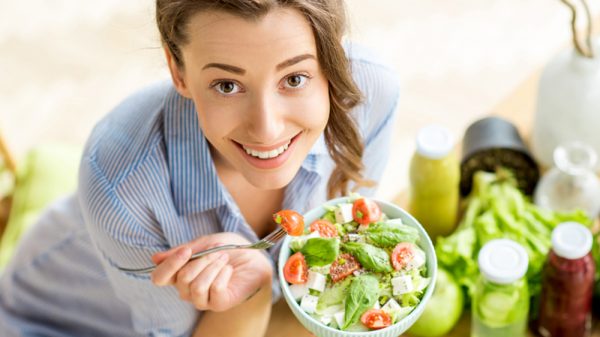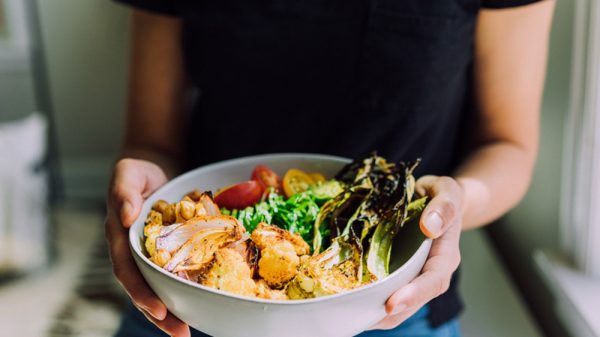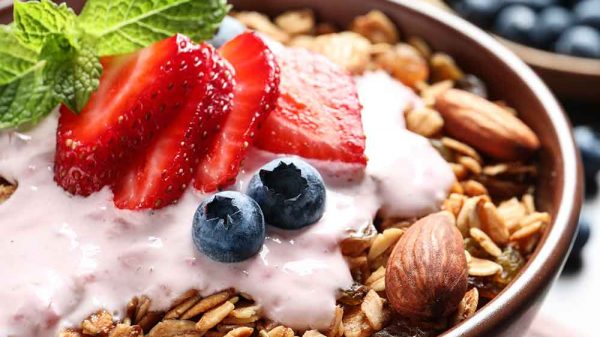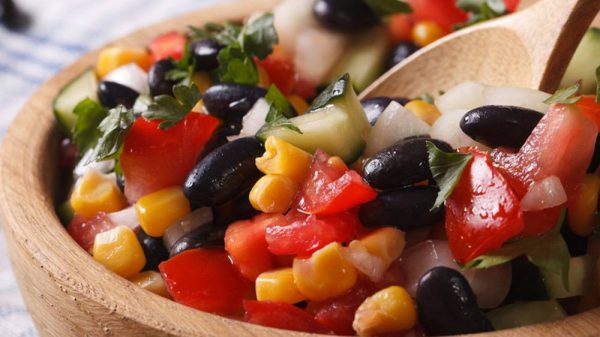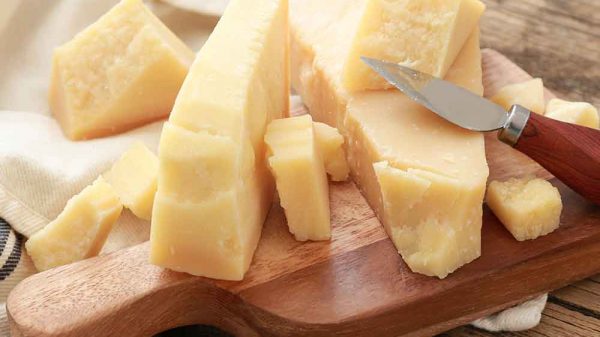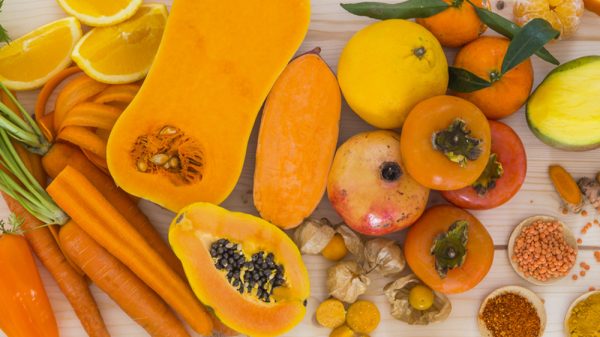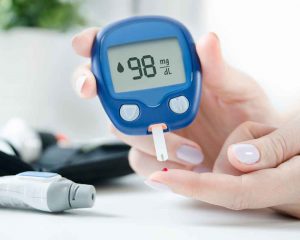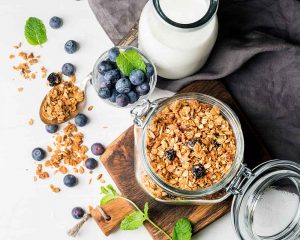Going vegan is a trendy diet that seems to be sweeping the nation. But what does it mean to be vegan, and how does the vegan diet differ from other fad diets? Most importantly, is a vegan diet healthy? In this article we go through everything you need to know about the vegan diet, and whether it works for fatty liver disease.
Plant-Based Diet vs Vegan: What’s the Difference?
The difference between vegetarian and vegan diets is pretty straightforward. A vegetarian diet doesn’t contain meat but may include animal products like milk, yogurt, cheese, and eggs.
The difference between a plant-based diet and a vegan diet is subtle. The terms “plant-based” and “vegan” essentially mean the same thing. The difference boils down to nuances in the terms’ connotations. When someone is described as vegan, this usually means that the person has decided not to consume any animal products at all, either for health, environmental, or animal protection purposes.
On the other hand, a plant-based diet can be completely vegan, or it can be simply what its title describes – a diet based on plants. Eating a plant-based diet doesn’t necessarily mean you forgo animal products completely, but instead suggests that they comprise a very small portion of your diet.
Despite these slight differences, the terms “vegan” and “plant-based” can be used interchangeably.
Vegan Health Benefits: Does a Plant-Based Diet Benefit Fatty Liver Disease?
Yes, but quality matters.
Regardless of the diet you follow, it’s clear that the quality of foods in your diet makes a difference. Before analyzing vegan diets, let’s first use an example involving vegetarian diets. Many people consider a vegetarian diet to be healthier than one that includes meat, simply based on the title of “vegetarian.” However, we tend to overlook the fact that a diet high in cheese, baked goods, and fried eggs is very unhealthy, despite the fact that it is vegetarian.
A study published in the Turkish Journal of Gastroenterology a great example of this exact principle. Researchers at the Department of Internal Medicine at Dongguk University Ilsan Hospital in the Republic of Korea studied the prevalence of nonalcoholic fatty liver disease among vegetarian Buddhist priests. The general outcome of the study is that vegetarian diets are not associated with a lower incidence of fatty liver disease. This at first may seem surprising, but what foods comprised the vegetarian diet in the study? Upon closer examination, the vegetarian diet studied was high in butter, eggs, baked goods. (1)
A study published in Clinical Nutrition and conducted by researchers at Chalmers University of Technology in Sweden and the University of Cape Town in South Africa found that following a plant-based diet led to better indicators of liver function and a lower risk of fatty liver disease. However, in the abstract, there is a qualifier: “Healthy” plant-based diets were associated with these outcomes, not just any plant-based diet. (2)
Another example is the Mediterranean diet, which is non-vegan but is based on plant foods with smaller amounts of meat. The Mediterranean diet has long been associated with better health outcomes. Research even demonstrates the association between the Mediterranean diet and a lower risk of nonalcoholic fatty liver disease. It’s not the small amount of animal protein that’s lowering the risk, it’s the fact that the diet largely emphasizes fruits, vegetables, whole grains, nuts, and seeds. (3)
In summary, an unhealthy vegan diet is one that consists primarily of white grains, added sugars, and manufactured meat substitutes and is low in fresh fruits, vegetables, legumes, and whole grains. This example of an unhealthy vegan diet is, in fact, less healthy than non-vegan diets that are based on whole foods with small amounts of animal products.
The Right Way to Follow a Plant-Based Diet
So, is being vegan healthy? Absolutely, when done the right way.
When a plant-based or vegan diet is based on whole foods and is carefully planned to ensure that all nutrients are provided, it is extremely beneficial not only for fatty liver disease, but also for mitigating high cholesterol, diabetes, insulin resistance, and high blood pressure. In comparison to a diet rich in animal products, the plant-based diet is undoubtedly superior.
A diet based mainly on meat and dairy products is more likely to contain high levels of saturated fat that contribute to weight gain, a higher body mass index, and a higher risk of heart disease.
Meat and dairy products, regardless of fat content, may contribute to systemic inflammation, especially when eaten in large amounts. Trimethylamine n-oxide (TMAO) is a toxic byproduct of meat and dairy digestion and contributes to imbalances in the gut microbiome. Research shows that TMAO may be associated with metabolic conditions like insulin resistance and may even increase the risk of cancer. (4)
On the other hand, plant products support optimal gut health with prebiotics, soluble fiber, and insoluble fiber. These plant components feed the healthy bacteria in your gut, which combats inflammation and may improve liver health and brain health.
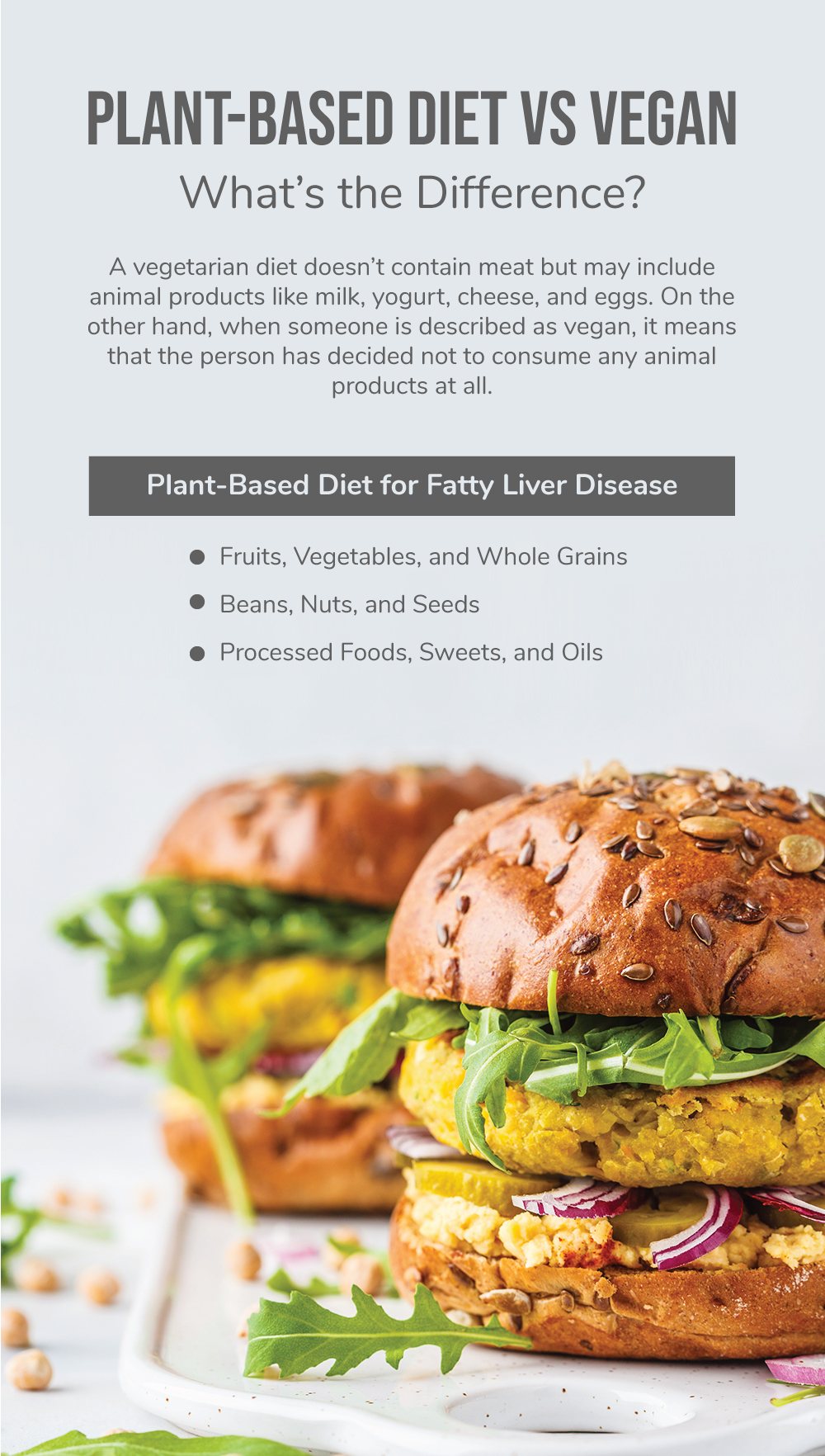
Plant-Based Diet for Fatty Liver Disease: What You Should Eat
We all remember the food pyramid from our childhood that detailed the foods we should eat the most and the foods we should consume in the smallest amounts. Let’s go over what you should eat on a vegan diet, in relation to the food pyramid we’re all familiar with.
First and Second Tiers: Fruits, Vegetables, and Whole Grains
The vegan food pyramid for optimal health is one whose foundation – the lowest levels of the pyramid – is comprised of fresh fruits and vegetables. This means an abundance of foods like leafy greens, broccoli, cauliflower, asparagus, apples, oranges, squash, sweet potatoes, beets, blueberries, and strawberries. A diet with a foundation of fresh fruits and veggies affords the most vitamins, minerals, fiber, and antioxidants that support liver repair and quell inflammation.
However, it can be difficult for fresh fruits and vegetables to provide all of the calories necessary to sustain your daily activities, especially if you lead an active lifestyle. For example, the sheer volume of spinach you would have to consume in order to get to 500 calories is staggering. Just for comparison, eating 500 calories worth of processed foods and baked goods is simple – it’s just a doughnut or two.
The second tier of the vegan food pyramid consists of whole grains like brown rice, quinoa, whole-grain bread, millet, and oats. In the interest of cost and time, the first and second tiers of the vegan food pyramid can be interchanged to still yield clear health benefits. Whole grains contain antioxidants as well as essential amino acids, B vitamins, and fiber.
Fruits, vegetables, and whole grains altogether provide critical micronutrients. They also provide a key macronutrient: carbohydrates. Because of the composition of the vegan food pyramid, carbohydrates will naturally be the dominant macronutrient in your diet.
Before this scares you off, keep in mind that there are good carbohydrates and bad carbohydrates. The carbohydrates in a liver-friendly, plant-based diet are healthy and differ drastically from junk food carbohydrates. The carbohydrates found in whole foods like fruit are digested slowly because they are paired with soluble and insoluble fiber. As a result, blood sugar remains steady while providing all of your cells with the energy they need to function at optimal capacity.
Third Tier: Beans, Nuts, and Seeds
The third tier of the vegan food pyramid is comprised of beans, nuts, and seeds. These foods tend to be more calorie-dense and provide lots of protein, fiber, minerals, vitamins, and healthy fats. Great options in this tier of food include black beans, chickpeas, lentils, walnuts, almonds, hazelnuts, pecans, pumpkin seeds, sunflower seeds, flaxseeds, and chia seeds. Another food that is part of the third tier in the vegan food pyramid is tofu. Tofu affords lots of protein, and minerals like calcium and iron.
Fourth Tier: Processed Foods, Sweets, and Oils
The fourth tier contains all the foods you should eat in the smallest amounts. Even though plant-based oils like olive oil, sunflower oil, and avocado oil contain healthy oils, they should still be used sparingly. Oils are not liver-friendly when consumed in excess.
There are also tons of vegan sweets on the market, from “cream-filled” doughnuts to vegan ice cream. Though vegan, these products are usually packed with refined flours and added sugars and low in antioxidants and protein.
There are also lots of vegan versions of fatty foods like cheese, cream, sausage, pepperoni, and burgers. However, these foods are often processed and contain lots of preservatives, sodium, and saturated fat from coconut. Saturated fat from coconut is better for you than saturated fat derived from animal products, but it’s still better to use it only occasionally. Save processed vegan foods for the occasional quick dinner or sweet snack to satisfy a craving.
Precautions If You Decide to Be Completely Vegan
A plant-based diet that completely eliminates all animal products can severely limit your access to certain nutrients that are vital for your health. If you cut out any and all animal products, you are eliminating major sources of certain essential nutrients. Just be aware of what vitamins you may be missing and be sure to adjust your lifestyle or supplement when needed.
How to Get Vitamin D as a Vegan
Vitamin D is a critical nutrient that is vital to supporting bone growth and healthy immune response. The primary sources of vitamin D in omnivorous diets are fatty fish, eggs, and cheese. If you decide to follow a plant-based diet, dietary vitamin D sources are limited to fortified breads, cereals, soy milk, and juice.
Additionally, vitamin D is synthesized in your skin during sun exposure. Try to get about 15 minutes of sun exposure each day, if possible, in order to support healthy levels of vitamin D.
In many cases, it may be necessary to supplement with vitamin D in order to ensure optimal levels.
How to Get B12 as a Vegan
The dietary sources of B12 are mainly animal products, including meat, cheese, yogurt, and eggs. Vitamin B12 is a product of the activity of bacteria that are present in the guts of animals. Synthesized B12 is then absorbed in the digestive tract and deposited in meat. Sometimes, not even meat contains enough B12 to satisfy the recommended intake. Meat eaters and vegans alike may benefit from B12 supplements.
How to Get Protein as a Vegan
As a vegan, getting adequate amounts of protein – in terms of quantity – is actually surprisingly easy if you eat primarily whole foods. Protein is abundant in tons of whole grains, nuts, beans, and seeds. Good sources of plant proteins include brown rice, quinoa, black beans, walnuts, flaxseeds, chia seeds, tofu, and tempeh.
The only question is making sure you get high-quality protein that affords optimal ratios of essential amino acids. There are nine essential amino acids: acids are histidine, leucine, isoleucine, valine, methionine, lysine, tryptophan, threonine, and phenylalanine. We must obtain certain amounts of these amino acids through the foods we eat since the body is unable to synthesize them. A single piece of meat or dairy product will provide optimal ratios of amino acids that our cells need to carry out all biological processes.
Aside from tofu and tempeh, which contain all essential amino acids, any one plant protein will not afford all of the essential amino acids that your body needs in order to function properly. Therefore, it is important to eat a variety of whole grains, beans, nuts, and seeds in order to satisfy essential amino acid requirements for the day.
As is the case with vitamin B12 and vitamin D, essential amino acid supplements may be helpful in providing the nutrients you need so you don’t have to worry about planning your diet around getting enough of these nutrients.
Making Balanced Choices
It’s clear that a diet consisting primarily on whole, plant-based food is associated with the best outcomes for numerous conditions, including fatty liver disease. However, if you are in a position where you have limited food choices, weigh all options and make the most balanced decision possible.
For example, if you’re at an event that is serving baked salmon, grilled vegetables, and white pasta salad, it may be the best idea to fill up on the grilled vegetables and supplement with a small piece of salmon. That way, you can avoid the refined grains that will spike your blood sugar and contribute to insulin resistance.
At the end of the day, it’s important to make balanced decisions that prioritize your health and consider all factors, without being overly restrictive.
Conclusion
The bottom line here is that “vegan” or “plant-based” does not automatically equate to “healthy.” A vegan diet can be unhealthy if it is high in processed foods and refined sugars. But, a well-planned vegan diet rich in whole foods like fruits, vegetables, whole grains, and legumes has numerous benefits for liver health, metabolic health, gut health, and cardiovascular health.
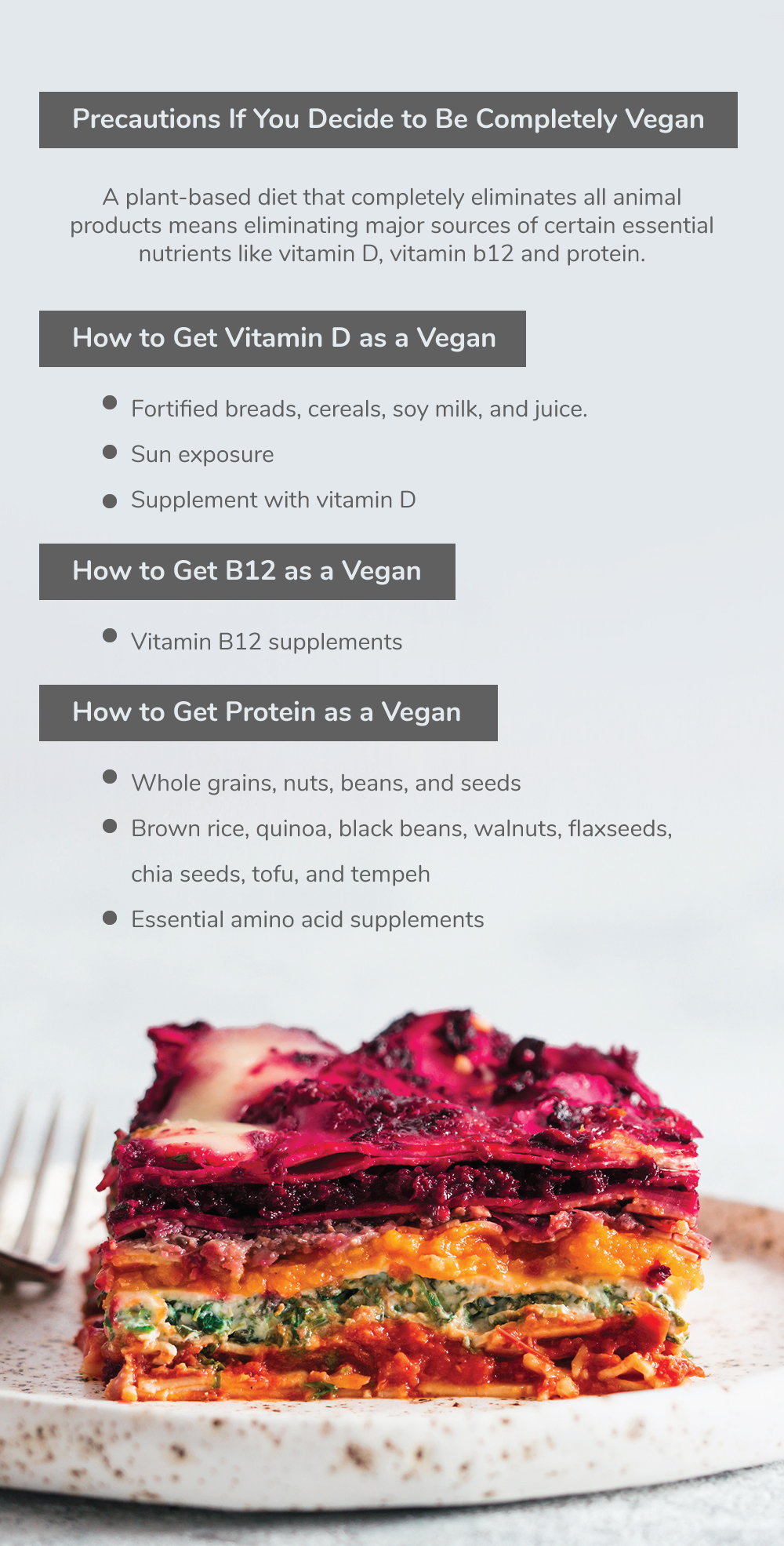
References:
(1) https://www.ncbi.nlm.nih.gov/pubmed/26039004
(2) https://www.ncbi.nlm.nih.gov/pubmed/30578029
